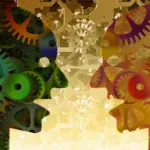Thinking and constructing a more or less elaborate speech may seem simple, since it is something that is done continuously. However, it is a complex and laborious process that involves a large number of mental subprocesses and intermediate steps.
A large majority of the population manages to carry out these processes successfully and structure a coherent and cohesive internal discourse that is capable of expressing and transmitting to others through rich and elaborate language.
However, there are a large number of people who are incapable of establishing logical and understandable speech. This occurs in cases where it enters the scene a psychological phenomenon known as alogia. Why is this happening?
What is alogy?
The alogy is an alteration of the form and content of thought and language in the form of impoverishment, impoverishment observable in oral discourse.
Although it is observed in the language, The main alteration of people with alogy is at the level of thought. This is revealed to be illogical and uncoordinated, slow and with severe difficulties for abstraction. It is difficult to develop and manage different ideas, taking longer to respond to external stimulation.
Despite the large number of aspects it incorporates, alogy It is not considered a disorder per se but rather a symptom of another pathology or alteration. as occurs for example with abulia.
Associated symptoms
The most visible symptoms are the presence of decreased fluidity of thought uninformative speech content and the reduction in the level of spontaneity.
The person with alogia has less than fluent speech expressing themselves through brief communications and even based on monosyllables. Speech stops being spontaneous and one’s own attempts to communicate with the environment are reduced, becoming more reactive. When it occurs, communication tends to be very specific, repetitive and with little content and information reflected in it. It is also common for blockages and interruptions to appear in both speech and thought, losing direction. For this reason, derailments and loss of association between the different components of the discourse often occur.
Another relevant aspect is the difficulty in capturing metaphors and symbolic language. so the person tends to understand and use only the literal meaning of the terms.
For all that it implies, alogia It represents a high level of alteration in the life of those who suffer from it. Social interaction is greatly hindered, resulting in severe difficulties in family and social life. There is also a great effect in the workplace, as well as in the rest of the individual’s vital areas.
Causes of alogia
Alogia is a symptom linked to logic, the ability to link thought, inhibit it and manage it consciously. The causes of this alteration are linked to a dysfunction in dopamine synthesis in specific areas of the brain, specifically the mesocortical pathway. The regions that are part of this pathway do not receive enough of this substance, which causes both alogia and other negative symptoms.
Apart from that It can also occur due to the presence of lesions in said pathway. in the connection of the frontal lobe with the basal ganglia or due to different types of damage to the temporal lobe, specifically in Wernicke’s area and other areas linked to language.
Disorders in which it appears
Alogia or poverty of thought It is especially visible in schizophrenia presenting itself as a negative symptom. In fact, it is one of the main negative symptoms of this disorder. This implies that it represents a severe reduction of the subject’s basic capabilities.
In addition to schizophrenia, alogia can appear in other disorders. For example, It is common to occur in people with dementia. It is also not strange that it appears in other types of pathologies, especially when they have psychotic characteristics.
Finally, manifestations similar to alogia have sometimes been described. as an adverse reaction to some medications or substances that reduce the level of dopamine in the brain. A classic example is classic antipsychotics, which act by reducing the level of dopamine in a non-selective manner. Although this is useful in certain nervous pathways to reduce positive symptoms, in others it can hinder and aggravate, and even generate, negative symptoms such as alogia.
Treatment
The treatment of this type of symptoms can be complex to achieve, but despite this, more and more progress is being made in this regard. As in many other cases, the way to treat a symptom such as alogia It will depend largely on its etiology (causes).
Taking into account that it is especially linked to schizophrenia, At a pharmacological level, atypical antipsychotics are usually used. which generate an increase in dopamine at the mesocortical level by acting as serotonin antagonists in different brain nuclei (which in turn inhibits dopamine synthesis, so an inhibitor would be inhibited).
The use of amphetamine derivatives It also seems to generate positive results when the aspect to be treated is only the presence of alogia, although more research is required in this regard. This consideration should not be taken into account in the case of schizophrenia, since increased activation could generate psychotic breaks and positive symptoms.
On a psychological level The use of different types of therapies is recommended depending on the origin of these symptoms. Regardless of the specific programs used, in general psychosocial rehabilitation and psychoeducation are useful both for the individual and for the environment to have tools and guidelines for action. Training in social and problem-solving skills can also help.









